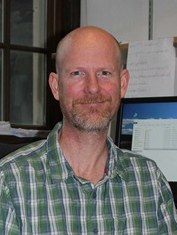NIMBioS Seminar Series
In conjunction with the interdisciplinary activities of the National Institute for Mathematical and Biological Synthesis (NIMBioS), a seminar series on topics in mathematical biology will be hosted at NIMBioS every other Tuesday at 3:30 p.m. (unless otherwise noted) in the Hallam Auditorium, Room 206, Claxton Building, 1122 Volunteer Blvd. Seminar speakers will focus on their research initiatives at the interface of mathematics and many areas of the life sciences. Light refreshments will be served in Room 205 beginning 30 minutes before each talk. Faculty and students from across the UT community are welcome to join us.
Speaker: Dr. Scott Nuismer, Biological Sciences, Univ. of Idaho
Time/Date: Tuesday, November 14, 2017, 3:30 p.m.*
Location: Room 206, Claxton Building, 1122 Volunteer Blvd.
Topic: Evaluating the promise of a transmissible vaccine
Abstract:
The development of viral vaccines has had remarkable and long-lasting impacts on human health and on the health of domestic and wild animal populations. Despite these impressive successes, many infectious diseases cannot yet be efficiently controlled or eradicated through vaccination programs because it is impossible to vaccinate a sufficient proportion of the population to guarantee herd immunity. Recent advances in molecular biology suggest that the centuries-old method of individual-based vaccine delivery could be on the cusp of a major revolution. Specifically, genetic engineering brings to life the possibility of a transmissible vaccine. In this talk, I will present the results of mathematical models quantifying the extent to which vaccine transmission can facilitate the eradication of endemic infectious diseases and reduce the magnitude of epidemics. In addition to quantifying these positive properties of vaccine transmission, mathematical results will illustrate key challenges imposed by vaccine evolution and identify potential solutions.
Scott Nuismer is a professor in the Department of Biology and affiliate faculty in the Department of Mathematics at the University of Idaho. The majority of work in Nusimer's lab revolves in some way around the potential for interacting species to coevolve. The coevolutionary questions currently focused on include: 1) Can we develop statistical methodologies that allow the strength of coevolution to be estimated from phenotypic data? 2) Is it possible to identify the genes mediating coevolutionary interactions in locally adapted systems? 3) What role does coevolution play in community structure and function? and 4) What practical insights can be gained through the perspective of coevolutionary medicine? Nuismer has a bachelor's degree from the University of Utah and a Ph.D from Washington State University. He completed a postdoctoral fellowship with Mark Kirkpatrick at the University of Texas Austin.
*Join us for refreshments at 3 p.m.
Seminar Flyer (pdf)
![]() Watch seminar online.
This seminar was streamed live. Live-streamed seminars are archived for later viewing on NIMBioS' YouTube channel.
Watch seminar online.
This seminar was streamed live. Live-streamed seminars are archived for later viewing on NIMBioS' YouTube channel.
For more information about this and other NIMBioS Seminars, visit /seminars.
NIMBioS
1122 Volunteer Blvd., Suite 106
University of Tennessee
Knoxville,
TN 37996-3410
PH: (865) 974-9334
FAX: (865) 974-9461
Contact NIMBioS



